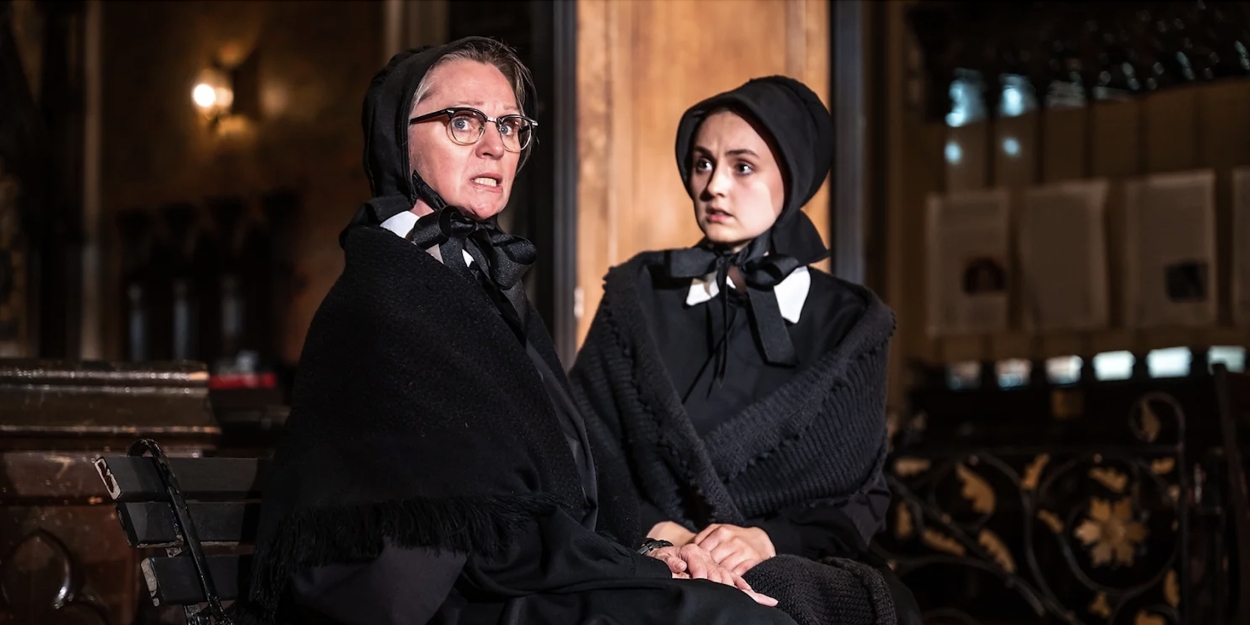Review: DOUBT at Church Of The Holy Trinity
No doubts about B&E's assured debut production

I missed seeing DOUBT: A PARABLE on Broadway in 2006 for want of $14 at the TKTS then cash-only booth. Though the show I saw instead was fabulous, after studying John Patrick Shanley's Pulitzer Prize-winning script, I always wondered if I made the right choice. The play claims that my doubt about this may be as enduring a force as certainty. Though I'll never know if the Broadway production would have been life-changing, I can say that the intimate, intense production by new company Breaking & Entering (B&E), set within the confines of The Church of the Holy Trinity, certainly makes a convincing argument.
Set in 1964 at a Catholic school in the Bronx, the show mines the turbulent time after the death of President Kennedy to explore issues of racism, sexism, and sexual abuse that are as sadly relevant now as they were then. Sister Aloysius (Deborah Drakeford), a no-nonsense martinet of a headmistress who believes that sin comes from seeking the approval and kindness of others, is deeply suspicious of newcomer Father Flynn (Brian Bisson) and his overly-friendly relationship with the school's first Black pupil.
When young idealist Sister James (Emma Nelles) thinks she smells alcohol on the boy's breath, the added evidence is enough for Sister Aloysius to begin a campaign to remove the priest from his post. However, it's not as simple as making an accusation; the rules and hierarchy of the Catholic church are not friendly to women, even nuns, in a he-said, she-said situation, and the potential for claims of abuse to simply disappear in an institution that prioritizes obedience is high.
In his nuanced script, Shanley cleverly sows doubt in the audience as well as in the characters. Father Flynn is charismatic and kind; he wants to update the church to suit the changing times, even if that means letting the kids sing Frosty the Snowman. Sister Aloysius gives off the impression of a worn battle-axe, firmly stuck in her ways, angry, bitter, and not much fun to spend time with.
The show constantly asks us who we want to believe, with the audience surrogate, the credulous Sister James who longs for kindness, caught between them. Is Aloysius off-base just because she is unpleasant, Flynn wrongly accused? Is Flynn guilty because charisma often hides a snake underneath, and we need to learn that righteousness can come in an unpalatable guise? Or are both of these potential readings too simple, and will we never know what happened, no matter how badly we want to force the story into our preferred narrative?
The script is aided by strong performances all around. Bisson's Flynn radiates approachability, and in his preaching directly to the audience, it's easy to be charmed by his easy, "aw shucks" smile. He seems genuinely upset by the accusation that he might not have his charges' best interests at heart. On the other hand, when he is threatened, his placid face suddenly sports empty, hard eyes and a sneer, leading us to wonder which is the façade.
Drakeford's Aloysius is particularly impressive, all steely, cool anger and cutting quips. The initial impression that she indomitably rules the roost is thrown into question by the flashes of genuine fear during her confrontation with Flynn, aided by the height difference between the actors that makes her physically vulnerable. Nelles' James is wide-eyed and teary at the thought that she might be failing her students, but grows more and more resolute. A scene where a tea order serves as a metaphor for the characters' conflict is beautifully played.
Director Stewart Arnott's choice of space adds a sense of realism to the show, the matinee performance bathed in heavenly light through stained glass windows, and featuring resonant acoustics (almost too resonant; Nelles' first few lines get a little lost). This is a powerful site-specific experience, though I wouldn't call it an immersive one as advertised; the show is performed as normal, using the church and pulpit as a stage and backdrop. The simple set, an office setup and a bench, looks appropriately period. That we can see the altar through the "wall" at the back of the office is a reminder that, even with the door closed, the Church sees all.
While each actor delivers a powerful, committed performance, the show comes blazingly alive with the entrance of Kim Nelson as Mrs. Muller, the boy in question's mother. She makes the most of her comparatively short time on stage, her mixed and frustrated emotions flitting across her face. Fear of her husband's retribution wars with pain for her child, commingled with an uneasy relief that someone might show him kindness.
Above all, though, she projects a blunt, tough pragmatism born out of years of having to sacrifice, compromise, and make herself smaller in a country that shows its true ugliness over the colour of her skin. Her measure of how much time remains to endure present conditions, delivered as a mantra with blazing eyes, is chilling. She reminds us of the emptiness of moral actions performed at the expense of the people they are supposedly serving, asking: who really gets hurt?
In a sermon, Father Flynn tells us that despair can bond us with those around us; being together with others during horrible events can at least remind us that we are not alone. Worse, he says, is to be isolated; to see the world "as if through a window." These lines feel newly painful amidst the recent crisis of forced isolation, but also cautionary, as characters constantly debate choosing community acceptance over personal morality.
While I may have missed my first chance to see the show, I'm glad I saw this one...without a doubt.
Photo of Deborah Drakeford and Emma Nelles by Dahlia Katz
Reader Reviews

Videos

